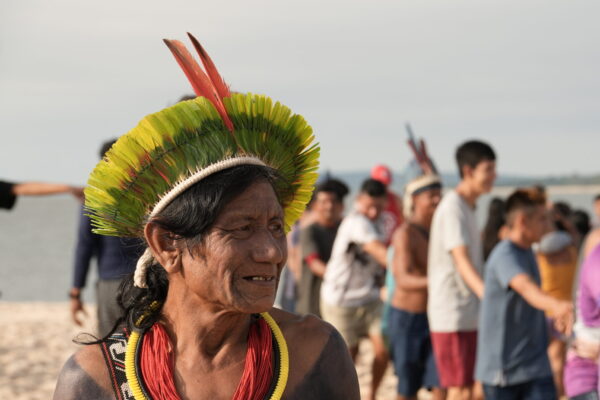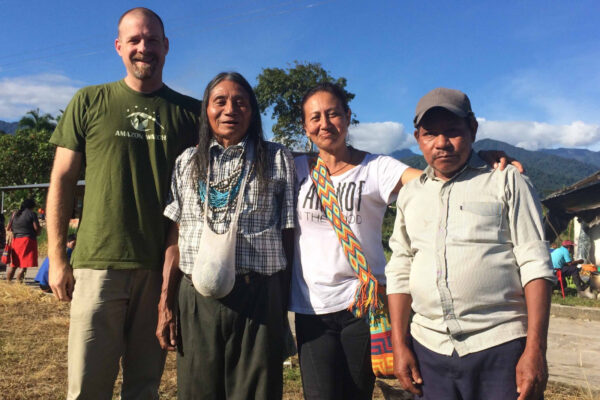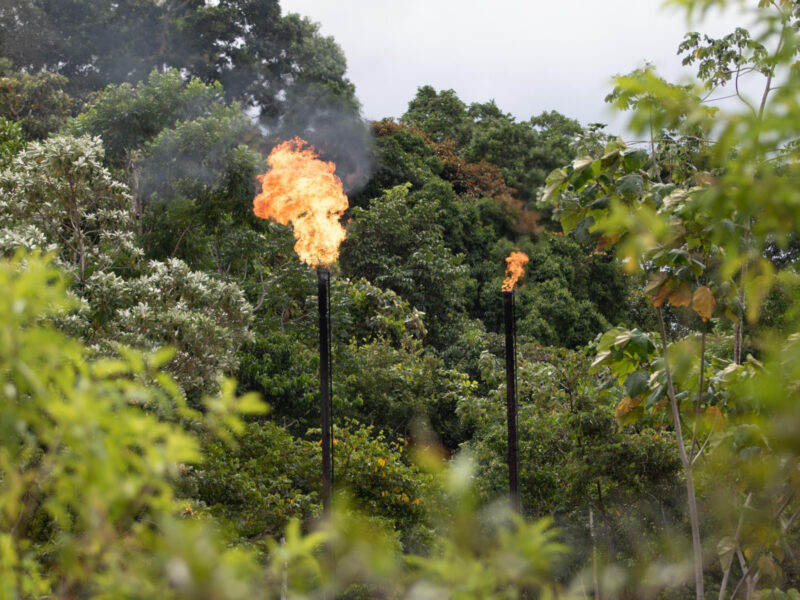The colorful streets of Cali, Colombia were enlivened by Indigenous and frontline communities from across the Amazon and globe converging at the 16th Conference of the Parties to the United Nations Convention on Biological Diversity (COP16). They united to confront the corporate interests and extractivist economies that are driving both catastrophic global biodiversity loss and the climate crisis.
The Amazon rainforest is one of the world’s epicenters of biodiversity, home to one-third of the Earth’s plant and animal species and producing one-fifth of all fresh flowing water. Yet, the extractive fossil fuel and mining industries, emerging transnational criminal economies, and wide-spread deforestation driven by industrial agribusiness are pushing this vital biome and its rich tapestry of biodiversity to the brink of a devastating ecological tipping point.
The most devastating fires in two decades ravaging the rainforest remind us that global biodiversity loss and the climate crisis are inextricably linked and mutually reinforcing. As historic climate change-induced droughts in the region make the forests more flammable, vital habitats teeming with genetic diversity are being destroyed. As global biodiversity plummets, it reduces the ability of critical biomes like the Amazon rainforest to absorb carbon dioxide, fueling a disastrous feedback loop that exacerbates climate change and threatens all life on Earth.
Indigenous peoples in the Amazon and across the world are risking their lives to defend global biodiversity and fight against the climate crisis, underscoring that protecting their land rights is the most effective way to safeguard remaining global biodiversity and our collective future.
Amazon Watch was honored to accompany our Indigenous partners from across the Amazon to amplify their frontline solutions and demands at public events, negotiations, and strategy sessions. Through our side events that we organized over the span of the two weeks in Cali, we were proud to partner with Indigenous communities, women Earth defenders, and civil society allies to amplify our international campaigns to curb the rise of criminal economies, defend women defenders of the Amazon, call for an urgent global phase-out of fossil fuels, and demand that the Amazon and other critical ecosystems must be designated as “no-go zones” for mining.
Confronting criminal economies
Herlín Odicio continues to demonstrate remarkable courage in the face of existential threats to his livelihood and ancestral territory in the Peruvian Amazon. Forcibly displaced from his community and severed from his traditional ways of life, Herlín has become a key leader of the Kakataibo people, serving as Vice President of ORAU (AIDESEP’s regional organization in Ucayali) and an outspoken advocate against the catastrophic impacts illicit economies like drug trafficking and illegal gold mining are inflicting upon Indigenous communities across the region.
Amazon Watch’s groundbreaking report, Amazon Underworld, revealed that burgeoning networks of transnational organized crime are present in 70 percent of municipalities in Amazonian countries, rapidly emerging as one of the leading threats to global biodiversity and climatic stability. This expansion of illicit economies has also made the Amazon one of the most dangerous regions in the world for land defenders like Herlín, who often risk their lives to protect the rainforest and their Indigenous communities who depend upon it for their livelihoods.
COP16 was a critical forum for Indigenous Amazonian leaders to advocate for regional cooperation and international solidarity with their communities, reminding them that Indigenous land rights and self-determination are the most effective strategies to contain transnational criminal economies and safeguard one of the world’s epicenters of biodiversity.
Building off of years of deep solidarity with Indigenous communities in the region to protect and expand their land rights, Amazon Watch was proud to accompany Kakataibo and Quichua leaders from Peru and Ecuador who denounced illicit economies at our events, as well as various panels and bilateral dialogues over the two weeks of the summit.
Can you chip in $10 to help protect Indigenous Earth Defenders?
They fight for the Amazon and our climate future every day, and your support can make all the difference.

Throughout our events, Indigenous leaders were in dialogue with international journalists, policy experts, and security representatives, elevating their powerful solutions to counter organized crime, such as official land titling, formal recognition of their self-protection mechanisms, investment in Indigenous alternative economies, and increased collaboration from state institutions and law enforcement.
Fiercely pushing back against rampant corruption and state complicity across Amazonian countries, amid the two weeks of official negotiations, Indigenous leaders, alongside their national organizations Confederation of Indigenous Nationalities of Ecuador (CONAIE), the Confederation of Indigenous Nationalities of the Ecuadorian Amazon (CONFENIAE), the Interethnic Association for the Development of the Peruvian Rainforest (AIDESEP), the Autonomous Territorial Government of the Wampis, and ORAU, delivered an open letter to Amazonian countries and international community, imploring them to stand in solidarity with their communities.
“Right now the Amazonian peoples are fighting back against organized crime and protecting our common future. We need the international community to step up and take their responsibility,” reminded Shipibo Konibo leader Miguel Guimaraes, the vice president of AIDESEP.
Herlín echoed Miguel’s sentiment, demanding that their communities “need real combined efforts between governments and our organizations if we want to defeat criminal economies” and safeguard global biodiversity.
Together, Herlín and Miguel declared to the world that the Amazon is in a state of emergency, underscoring that the time for action is now.
We lament that the final agreements coming out of COP16 failed to include clear measures against organized crime. Nonetheless, the leadership of Indigenous land defenders like Herlín and Miguel throughout the summit elevated the issue of transnational criminal economies on official agendas for the first time at a biodiversity summit.
Their pivotal efforts are pathing the path forward towards deeper global awareness and regional and international collaboration on the emerging threat, evidenced by Martin Von Hildebrant declaring that “bringing security to the peoples and ecosystem of Amazon” is one of the main priorities for the collaboration between Amazonian nations at his inauguration as the new secretary general of the Amazon Treaty Cooperation Organization (ATCO).
Defending the defenders
Jani Silva is a fierce leader defending the environment and peasant communities from the Putumayo region of Colombia. Jani – like many Indigenous and campesina women across the Amazon – is a bearer of knowledge and traditional wisdom in her community, risking her life to defend the land from extractive industries in the most dangerous country for Earth defenders in the world.
Jani’s remarkable work to defend human rights and the rights of nature amid ongoing armed conflict and existential threats underscores the indispensability of women’s leadership to the struggle to defend remaining global biodiversity and our collective survival.
At Amazon Watch, we have been committed to defending Indigenous and Women earth defenders at risk for nearly three decades.
We were proud to accompany a delegation of environmental defenders from the Colombian Amazon at the COP16, facilitating their participation through our Amazon Defender’s Fund. With an eye toward raising the profile of their perspectives, we partnered with Association for the Sustainable Development of the Amazon Pearl (ADISPA) spokespeople like Jani to coordinate their participation in multiple public events and press efforts throughout the summit.
Given the ongoing threats against Jani and other leaders from the Amazon Pearl, we collaborated with Justicia y Paz and Peace Brigades International to connect Jani with numerous ambassadors from Europe and Canada.
During a high-level side event hosted in the United Nations pavilion, the Swedish Ambassador Helena Storm praised Jani and passed her the microphone to elevate her urgent message to the international diplomatic community gathered in Cali. Jani underscored the efficacy of accompaniment to protect grassroot movement leaders and Earth defenders, testifying that “when the violent actors see that our processes are accompanied and that in reality we are doing something, they have to respect us a little more.”
It is particularly concerning that this critical role that women and Indigenous Earth defenders play in protecting biodiversity and climate was overlooked at COP16.
As international negotiations on addressing the climate crisis are currently underway at COP29 in a country that is notorious for violent repression of human rights defenders and climate activists, we underscore that the rights of nature and its greatest guardians must be protected.
The pursuit of true peace with nature
Two weeks of fierce resistance and advocacy from Indigenous and frontline communities both within and beyond the official negotiations, led to historical gains at COP16.
At COP16’s conclusion, Indigenous knowledge, peoples, and territories were finally acknowledged through the decision to establish a subsidiary body under Article 8(j) of the convention. This new body is a significant milestone, with UN parties affirming the importance of meaningful participation by Indigenous Peoples and communities of African descent in meeting the convention’s objectives. It creates a permanent space for their involvement in biodiversity decision-making and marks an important step toward racial justice within the UN Biodiversity Convention (CBD).
We recognize the leadership of Amazonian countries like Colombia and Brazil. As Brazilian Minister of Indigenous peoples Sonia Guajajara emphasized, “The role of Brazil [at COP16] was key in coordinating with countries opposed to the creation of the subsidiary group, leading to this important achievement, which represents Indigenous peoples’ participation and leadership in guiding agreements and negotiations on biodiversity.”
Despite this progress, we regret that the work program negotiations sacrificed essential gains on gender and human rights defenders from prior dialogues. As with UN Climate Conferences, such as COP29 currently underway in Baku, corporate interests infiltrated COP16, significantly undermining efforts to align biodiversity preservation with climate crisis solutions and instead prioritizing the status quo.
We denounce the ongoing failure to address fossil fuel extraction and the promotion of false solutions, like carbon and biodiversity credits, which continue to commodify nature. As Cris Julião Pankakaru, International Coordinator of the National Articulation of Indigenous Women Warriors of Ancestry (ANMIGA), echoes, COP16 “negotiations reflect a marketplace for biodiversity, where interests still lean more toward control, guardianship, and bargaining rather than considering climate justice and the right to exist and live according to Indigenous ways of life.”
With few countries presenting robust plans for implementation of biodiversity protections, she emphasized that there is limited clarity on global financing mechanisms and the inclusion of Indigenous solutions.
On the path to the historic COP30 in Brazil in 2025, Amazon Watch will continue working in solidarity with Indigenous communities, uplifting their wisdom and solutions as pathways to true harmony with nature and global climate justice.


























